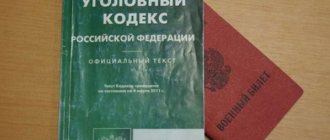Commentary to Art. 339 of the Criminal Code of the Russian Federation
The object of the crime is the established procedure for performing military service and fulfilling the obligation to perform military service.
The objective side of the crime is characterized by action and consists in the evasion of a military serviceman from performing the duties of military service. Evasion involves the permanent or temporary release of a serviceman from the performance of military service duties. Methods for committing evasion are expressly specified in the law. These include:
— simulation of illness;
— causing any damage to oneself (self-mutilation);
- forgery of documents;
- another deception.
Feigning an illness consists of attributing to oneself any illness or exaggerating the symptoms of any illness (mental disorder, blindness, deafness, etc.), i.e. deliberate depiction or statement by a military serviceman for the purpose of obtaining exemption from military service (permanent or temporary) about the presence of diseases that he does not actually suffer from, or the deliberate exaggeration of diseases that he has for the same purpose (aggravation).
Self-harm is the deliberate infliction of bodily harm on oneself (damage to limbs, visual organs, burns, poisoning, etc.). The method of self-harm does not matter in determining the crime. It may involve the use of firearms or bladed weapons, household items (for example, a table knife, an ax), the use of chemicals, toxic substances, etc. In this case, harm to health can be caused both to the military personnel themselves who wish to evade the duties of military service , or by any other person at the request of the serviceman. The actions of this person should be qualified based on the totality of crimes as aiding and abetting in evading duties (Part 5 of Article 33 and Part 1 or Part 2 of Article 339 of the Criminal Code of the Russian Federation).
Document forgery involves the use of fake, falsified documents. Fake documents will be those in which false data has been entered in one way or another, or reliable data has been changed. The method of forgery does not matter for the crime under consideration. A completely fake document is also fake. The forgery can be carried out by the serviceman himself or by another person. If necessary circumstances exist, a legal assessment of the actions of such a person must be given in accordance with the norm on the totality of crimes.
Evasion from the performance of military service duties, committed by a military serviceman by forgery of documents giving the right to temporary or complete exemption from the performance of military service duties, is fully covered by Art. 339 of the Criminal Code of the Russian Federation.
The concept of other deception covers all other methods of evasion, with the exception of those listed. In particular, they may be an agreement with an official, his bribery, the use of personal friendly relations with the commander, sending another serviceman to a medical commission and other methods.
The corpus delicti is formal. The action will be completed from the moment of termination of military service duties (in whole or in part). The duration of evasion of military service duties does not matter for the completed crime.
In cases where a person commits the acts listed in Art. 339 of the Criminal Code of the Russian Federation actions with the aim of temporarily evading the duties of military service, but due to some objective circumstances these actions lead to his dismissal from military service (for example, the development of a disease due to injury caused by self-harm leads to unfitness for military service for health reasons) , the act is subject to qualification under Part 1 of Art. 339 of the Criminal Code of the Russian Federation.
The subjective side is characterized by direct intent. A mandatory sign of the subjective side is the presence of a special goal, namely, evasion of military service duties.
The subject of the crime is a special one - a military serviceman.
The perpetrator of the crime under Art. 339 of the Criminal Code of the Russian Federation, committed by causing any damage to oneself (self-mutilation), is a military serviceman, regardless of whether the damage to health was caused by the evader himself or at his request by another person. In the latter case, the criminal actions of such a person are subject to classification according to the totality of crimes as complicity in the commission of a crime under Art. 339 of the Criminal Code of the Russian Federation, and the corresponding crime against the person (for example, provided for in Article 111 or Article 112 of the Criminal Code of the Russian Federation).
The same actions committed for the purpose of complete exemption from military service duties constitute a qualified crime.
If a person pursued the goal of completely freeing himself from military service duties, but the crime was not completed due to circumstances beyond his control, the act should be qualified under Part 1 or Part 3 of Art. 30 and part 2 art. 339 of the Criminal Code of the Russian Federation. For example, if a person is found to have an instrument or means for committing self-mutilation, their search is qualified as preparation for evading military service duties in the specified manner. If the forgery of documents on the basis of which a person was subject to early dismissal from military service was discovered by the command, the act should be qualified as an attempted crime under Part 2 of Art. 339 of the Criminal Code of the Russian Federation.
Legal concept of evasion of service
Evasion from military service is an intentional action aimed at avoiding being drafted into the ranks of the Russian Armed Forces. These include:
- failure to appear at the medical commission;
- failure to appear when called by the draft commission;
- failure to appear at the point of departure to the place of duty.
These actions can be recognized as criminal, in accordance with Part 4 of Art. 31 of Federal Law (FZ) No. 53-FZ of March 28, 1998, subject to 2 conditions:
- lack of valid reasons;
- lack of notification to the conscript in the form of a summons.
It is worth considering that if a summons was not served on a citizen due to the fact that he is hiding and deliberately does not live at the place of registration, then he is subject to administrative punishment.
Judicial practice under Article 339 of the Criminal Code of the Russian Federation
Appeal ruling of the Judicial Collegium for Criminal Cases of the Supreme Court of the Russian Federation dated 10/09/2018 N 5-АПУ18-56 by
the resolution of the Deputy Prosecutor General of the Russian Federation dated June 28, 2021, the request of the Prosecutor General's Office of the Republic of Belarus for the extradition of E.V. Kazantsev was satisfied. law enforcement agencies of the Republic of Belarus to bring to criminal liability for hooliganism under Part 3 of Art. 339 of the Criminal Code of the Republic of Belarus.
Appeal ruling of the Judicial Collegium for Criminal Cases of the Supreme Court of the Russian Federation dated January 15, 2019 N 5-APU18-90
considered in open court the material on the appeal of Kostyukevich I.S. to the resolution of the Moscow City Court dated November 19, 2021, by which the resolution of the Deputy Prosecutor General of the Russian Federation dated October 19, 2021 on extradition to the competent authorities of the Republic of Belarus for criminal prosecution under Part 1 of Art. 339 of the Criminal Code of the Republic of Belarus
Appeal ruling of the Judicial Collegium for Criminal Cases of the Supreme Court of the Russian Federation dated 04/03/2019 N 78-APU19-5
On December 5, 2021, the Deputy Prosecutor General of the Russian Federation issued a resolution to satisfy the request of the Prosecutor General's Office of the Republic of Belarus to extradite Migal M.G., ... to the competent authorities of the Republic of Belarus for criminal prosecution under Part 1 of Art. 339 of the Criminal Code of the Republic of Belarus.
Determination of the Judicial Collegium for cases of military personnel of the Supreme Court of the Russian Federation dated January 17, 2019 N 201-KG18-39
By the resolution of the investigator of the military investigation department for the Lyubertsy garrison dated August 24, 2021, it was refused to initiate a criminal case against the administrative plaintiff on the grounds of crimes provided for in Part 1 of Art. 339 and part 3 of Art. 327 of the Criminal Code of the Russian Federation, due to the expiration of the statute of limitations for criminal prosecution.
Appeal ruling of the Judicial Collegium for Military Personnel of the Supreme Court of the Russian Federation dated September 12, 2017 N 209-APU17-2
sentenced to imprisonment under Part 2 of Art. 339 of the Criminal Code of the Russian Federation for a period of 2 years; according to paragraphs “a”, “b”, “c”, part 2 of Art. 158 of the Criminal Code of the Russian Federation for a period of 3 years; according to Part 1 of Art. 338 of the Criminal Code of the Russian Federation for a period of 4 years; according to Part 3 of Art. , part 3 art. 322 of the Criminal Code of the Russian Federation for a period of 3 years.
Appeal ruling of the Judicial Collegium for Criminal Cases of the Supreme Court of the Russian Federation dated October 31, 2017 N 5-APU17-107
By the verdict of the court of the Slonim district of the Grodno region of the Republic of Belarus dated August 21, 2014, Karpov, convicted by the verdict of July 2, 2014 under Part 2 of Art. 339 of the Criminal Code of the Republic of Belarus (malicious hooliganism), part 1 of Art. 206 of the Criminal Code of the Republic of Belarus (robbery) to 2 years 3 months imprisonment,
Appeal ruling of the Judicial Collegium for Criminal Cases of the Supreme Court of the Russian Federation dated January 18, 2018 N 38-APU17-11
On January 12, 2021, the General Prosecutor's Office of the Republic of Tajikistan addressed the General Prosecutor's Office of the Russian Federation with a request to extradite Abdukhalilov Orif Ruziboevich to the authorities of the Republic of Tajikistan in order to bring him to criminal responsibility under clauses “b”, “c”, part 4 of Art. 249 (robbery on an especially large scale with the use of weapons), paragraph “b”, part 3 of Art. 252 (theft of a car or other vehicles without the purpose of theft), Part 1 of Art. 255 (deliberate destruction or damage to property), Part 2 of Art. 339 (theft or damage to documents, stamps, seals) of the Criminal Code of the Republic of Tajikistan.
Appeal ruling of the Judicial Collegium for Criminal Cases of the Supreme Court of the Russian Federation dated October 10, 2018 N 5-APU18-58
By the resolution of the Deputy Prosecutor General of the Russian Federation dated July 23, 2021, the request of the General Prosecutor's Office of the Republic of Belarus for the extradition of A.V. Rzhevsky was satisfied. law enforcement agencies of the Republic of Belarus to bring him to criminal liability for hooliganism under Part 1 of Art. 339 of the Criminal Code of the Republic of Belarus, under Part 2 of Art. 166 of the Criminal Code of the Republic of Belarus for rape of a knowingly minor, again, under Part 2 of Art. 167 of the Criminal Code of the Republic of Belarus for committing acts of a sexual nature in relation to a knowingly minor, under Part 2 of Art. 339 of the Criminal Code of the Republic of Belarus for committing hooliganism repeatedly.
Appeal ruling of the Judicial Collegium for Criminal Cases of the Supreme Court of the Russian Federation dated August 28, 2019 N 5-APU19-61
competent authorities of the Republic of Belarus for criminal prosecution under Part 1 of Art. 339 of the Criminal Code of the Republic of Belarus. Having heard the report of judge Shmotikova S.A., the speeches of Lisitsyn V.A. and lawyer S.V. Romanov, who supported the arguments of the complaint, the opinion of the prosecutor of the General Prosecutor's Office of the Russian Federation N.V. Savinov. on leaving the decision unchanged, Judicial Collegium
Determination of the Judicial Collegium for Criminal Cases of the Supreme Court of the Russian Federation dated September 10, 2020 N 44-UDP20-14-K7
In accordance with the provisions of Part 3 of Art. 339 of the Criminal Code of the Russian Federation, after the main question about the guilt of the defendant, private questions may be raised, including questions that allow establishing the guilt of the defendant of committing a less serious crime, if this does not worsen the position of the defendant and does not violate his right to defense.
Article of the Criminal Code of the Russian Federation for evasion of military service
The legislation combines crimes of evading conscription for compulsory military or alternative civil service into one article of the Criminal Code of the Russian Federation - No. 328.
| Article of the Criminal Code of the Russian Federation | Corpus delicti | Punishment |
| 328, part 1 | evasion of military service in the absence of valid reasons for exemption from it | - a fine of up to 200 thousand rubles or the income of the convicted person for 1.5 years; - will force. work up to 2 years; — arrest up to 6 months; - imprisonment for up to 2 years |
| 328, part 2 | evasion of alternative civil service for persons exempted from service in the Armed Forces of the Russian Federation, without the presence of grounds for exemption from alternative service | — a fine of up to 80 thousand rubles or the culprit’s earnings for 6 months; - obligatory work up to 480 hours; - arrest up to 6 months |
Administrative responsibility
All male citizens from the age of 17 are registered with the military at their place of residence. Conscripts, in accordance with the law, are required to inform the military registration and enlistment office about changes regarding their place of residence and other information that may affect their conscription into the army.
These include:
- failure to notify responsible persons at the military registration and enlistment office about a change of residence for a period of more than 3 months;
- lack of notification from the conscript that he will be outside the Russian Federation for more than 6 months;
- failure to appear at the military registration and enlistment office for military registration or deregistration;
- failure to inform responsible persons at the military registration and enlistment office about a change in marital status, place of work or study.
The actions listed above entail administrative liability for the conscript in accordance with Article 21.5 of the Code of Administrative Offenses of the Russian Federation. Failure to appear at a medical commission in the presence of a summons is regulated by Art. 21.6 Code of Administrative Offences. The penalty for these offenses is a fine of 100 to 500 rubles. This applies only to cases where the violations were of a one-time nature; if the said violations were serious, then the conscript may be held liable for evasion under the Criminal Code of the Russian Federation.
Note! Compliance with penalties under the article of the Criminal Code of the Russian Federation for evasion of military service does not exempt a citizen from conscription into the ranks of the RF Armed Forces or, depending on the specific situation, from alternative service. According to Art. 23 (clause 3b) of Federal Law No. 53-FZ, a citizen is subject to conscription after the expungement of a criminal record, if at that time he does not exceed the conscription age.








